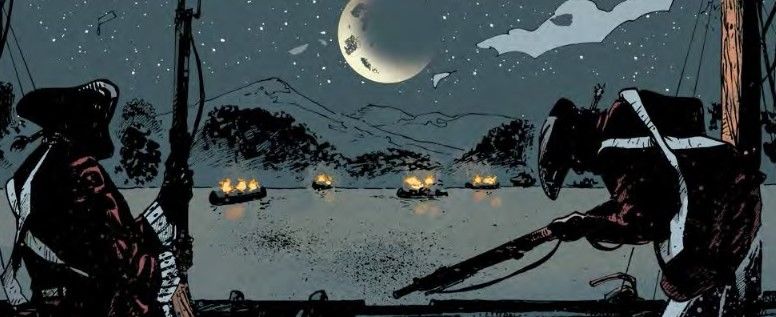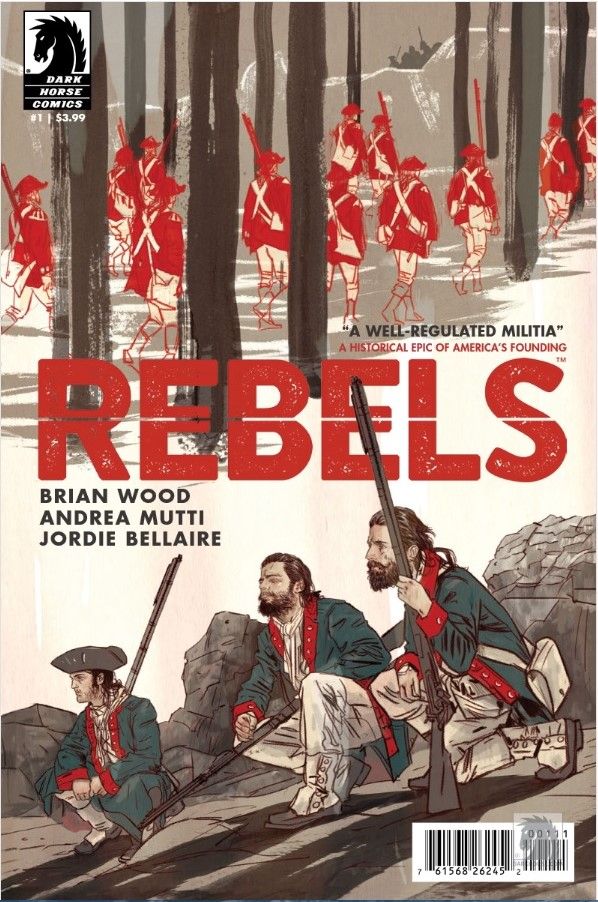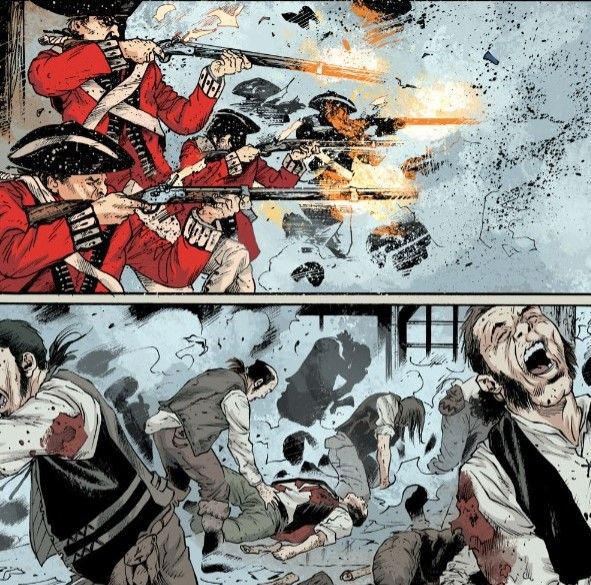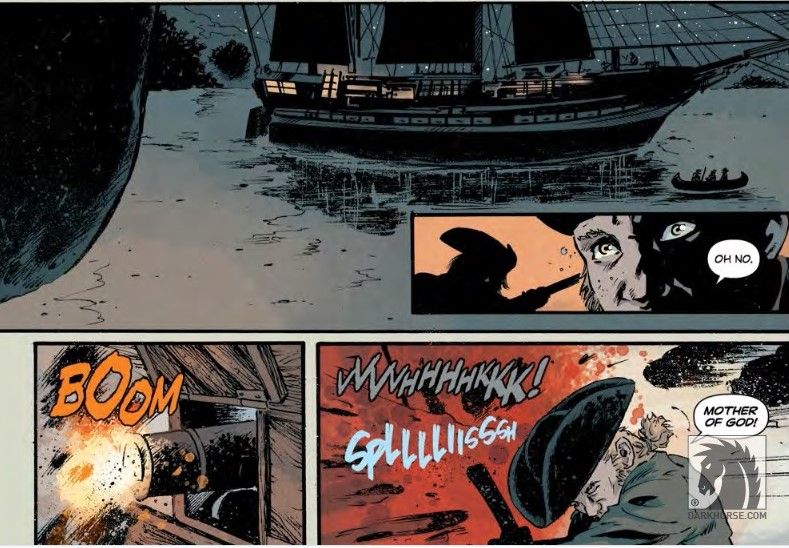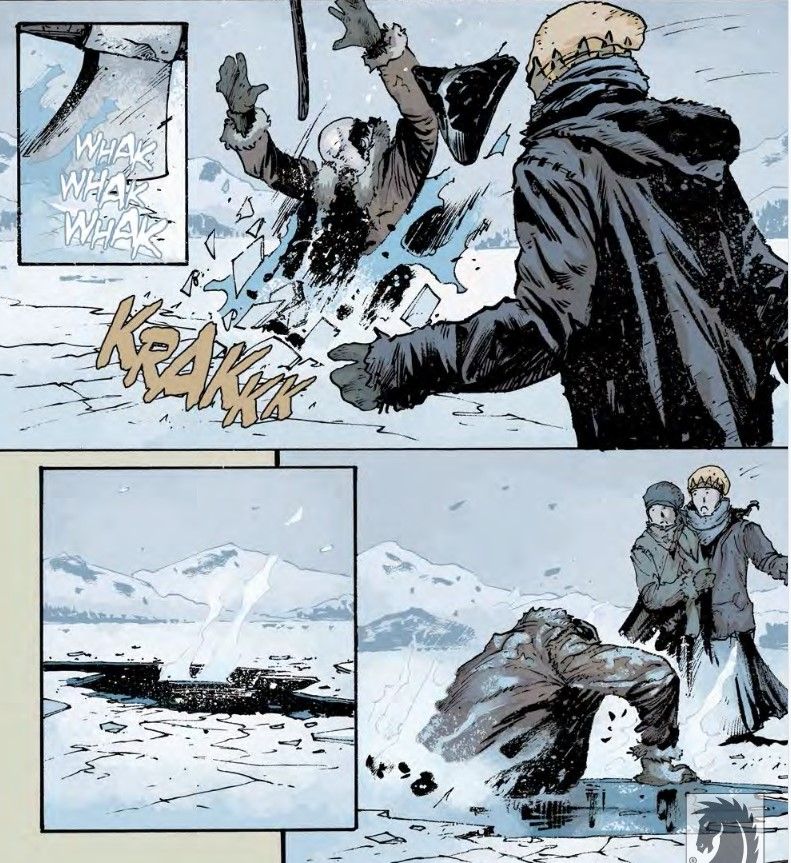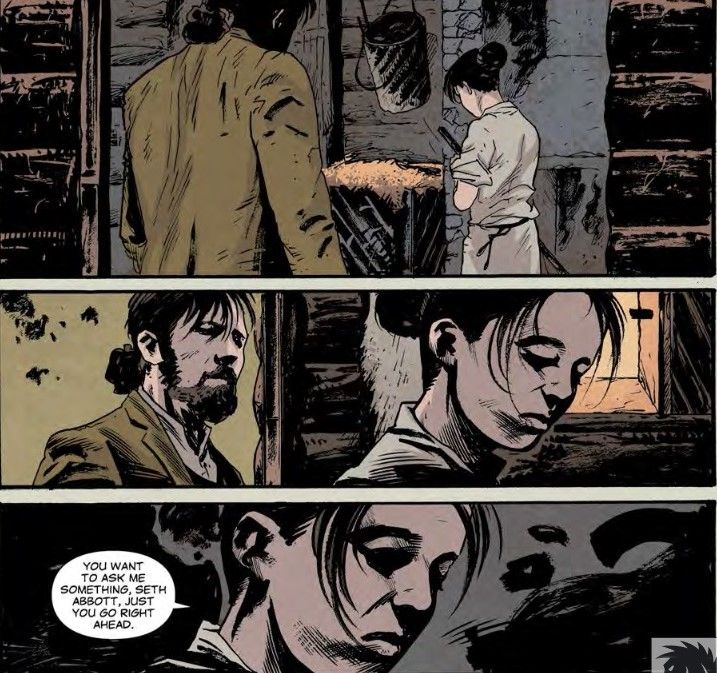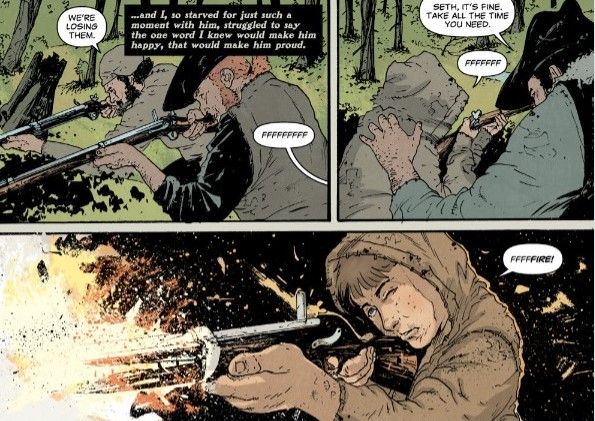"For every freedom fighter, I wanna hold on tighter to the hope and will you gave - you were the brave, you were the brave"
Brian Wood has some new comics coming out, one tomorrow and one that you can pre-order from Previews right now. He was nice enough to send me digital copies of both of them, and I'm going to review them!
I'll get to Starve in a few days (I wanted to do one review for the two comics, but real life caught up with me, and I don't have the time), but for now, let's take a look at Rebels, the American Revolution comic he's writing. It's drawn by Andrea Mutti, colored by Jordie Bellaire, lettered by Jared K. Fletcher, and published by Dark Horse. It will set you back $3.99.
Both comics scratch itches Wood has, and Rebels deals with the first one, which is historical fiction. One of Wood's finest comics, Northlanders, was in this vein, but Rebels is a bit different from that - it's more a "PG-13" comic rather than the R-rated book Northlanders was. There's some death and lots of shooting, but it's not too gory and nobody swears like a ... well, like a Viking, I suppose. It's the story of Seth Abbott, who joins Ethan Allen's Green Mountain Boys after a violent confrontation with the British in March 1775 (the "Westminster massacre," in which only two people died so I'm not sure if "massacre" is the correct term, but politicians used hyperbole back then, too!) convinces him that he needs to defend his land. Obviously, as this is a mainstream comic, there has to be action, but Seth marries a girl, Mercy, and their separation forms the emotional core of the book.
The splintering of families during wartime is a timeless and universal theme, and that becomes more important in issue #3, when Seth begins to realize that the fate of Vermont (then called the New Hampshire Grants) is tied to the rest of the colonies, while Mercy believes that he should stay near home to defend his land. Wood cleverly shows Seth has both a more modern sensibility than most of his ilk (he's not even 17 when he gets married, so maybe that's it) and also someone who remains trapped by social gender roles, as he understands the way Mercy is an equal partner in the marriage and is formidable on her own, but he still doesn't listen to her when she tries to argue with him. She, naturally (I say that because it's fiction, and people don't say things in fiction that they would in real life), doesn't tell Seth that she's pregnant when he leaves with Allen at the end of issue #3, and so she doesn't give him a reason to stay behind, implying either that she doesn't want him to resent her or that she really does agree with him. Presumably Seth is going to get captured with Allen in September 1775, because at the end of issue #3 he narrates that he doesn't see Mercy again for two years (Seth is obviously narrating this from some time in the future).
Wood does a nice job showing how neither Seth or Mercy is completely honest with the other (again, they're both 17 years old at the end of issue #3, so they're still fairly immature) and that the reasons for going to war and the reasons for not going to war are complicated. Seth isn't just doing this for the greater good, and Mercy doesn't want him to stay home just because she wants him to defend the land. Wood has always been good at getting at the unspoken in his characters, and while Seth is narrating so we know his mind, Wood doesn't do that with Mercy, so he relies on Mutti to show her emotional state.
The book isn't quite as subtle as Wood often can be - the Redcoats, so far, are a fairly faceless bunch of thugs, and we don't even really see any Loyalists who aren't fighting but still don't agree with the revolution. What we get instead are flashbacks to Seth's relationship with his emotionally distant father, who teaches him to shoot (the only time he speaks to him with kindness and encouragement) and who is saved by Seth when he falls through the ice one winter. Seth's father is dead at the beginning of the book, so the flashbacks are all we get of him, and they're fine, but so far, they don't add too much to the narrative. Before the credits in issue #1, we get Seth trying to say "fire" when the Redcoats are in his sights, but Wood establishes that he's reticent and doesn't speak very well, so by the time he says it, the British are almost out of range. Seth doesn't speak too much when he gets older, which makes him a good soldier, but it's not clear if we really needed the scene with his father to learn that.
In issue #3, we get the extended flashbacks as Seth tries to get his father home after he falls through the ice, and again, it's not a bad story, but it doesn't feel like it adds much. Seth's dad was a taciturn man. I bet a lot of fathers back then were too. I don't hate the flashbacks, but I do wonder if there's going to be any kind of pay-off, especially now that Seth has told us that he's going to be a father.
Mutti does stellar work on this book so far - I would say it's the best of his career, but Mutti's the kind of artist who seems to work on books that I'm not reading or as a fill-in artist on books I am reading, so I'm not up on his career as much as I am with some artists. As I noted above, Wood relies on Mutti to show Mercy's emotions more than he does with Seth, because she doesn't get narration, and Mutti does a really nice job with it. When Mercy is alone in their cabin, Mutti does all the heavy lifting, as she prepares dead animals for cooking (Mutti draws a wonderful panel of Mercy, speckled with blood, wiping her brow as she pauses in her work for a moment), sews, and sets traps in the forest. When he draws her with Seth, he does a nice job showing how happy she is that her husband is around until he tells her that he's planning on fighting farther afield for a larger cause, then Mutti is able to show her transition to slightly quiet anger (only slightly because she still gives Seth a piece of her mind). In issue #3, when he tells her he's leaving again, Mutti uses beautiful black shading to deepen the shadows around her face as she seems to recede from Seth. She's lost the battle, and she knows it even before he opens his mouth.
Mutti does a really nice job with the action, too - the "massacre" in issue #1 is tough to draw, as it takes place inside a fairly cramped room, but Mutti does a fine job with it, and the raid on Lake Champlain in issue #2 is tense and taut, and Mutti does a nice job with the climactic action, using three "wide-screen" panels to show a large scene and impressing us with its importance. The scenes with Seth and his father in the past are terrific, too, as Mutti draws a hostile, wintry world in which Seth and his father seem terribly small. Bellaire, as usual, does a terrific job with the colors, especially in the winter scenes, where the blues threaten to overwhelm the two small people. In issue #1, she does a good job making the farmers' clothes bland so that the Redcoats stand out even more, which isn't very unique but which is still pretty neat to see. Bellaire doesn't use too much rendering, so Mutti's lines remain crisp and fairly clean, which brings the forest alive and shows how isolated people in the 1700s, especially on the frontier, could be.
Rebels is in my wheelhouse, I must admit, because I love historical fiction, so it's certainly possible I like it more than most people would. But they're not writing about it, are they? I don't know if Wood has more than the six issues of this arc planned (if it will be a "Northlanders"-type comic, with different arcs and different artists), but after 3 issues, it's pretty neat.
Rating: ★ ★ ★ ★ ★ ★ ★ ½ ☆ ☆
In a few days, I'll write about Starve. It's also quite good!

